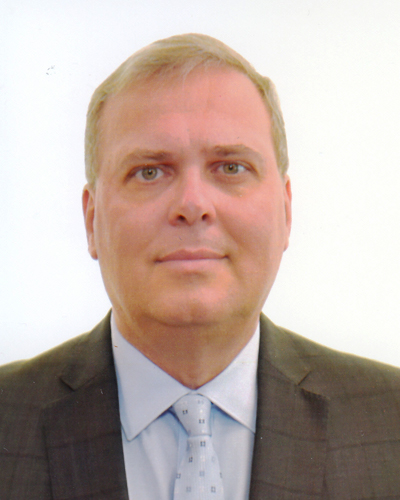
Master of Museum Education (MMEd)
Online (90%) | In Person (10%)
The next intake of the MMED (MED9) will commence September 2026, with applications being accepted from October 2025.
The Master of Museum Education is a unique graduate degree program focusing on the study of education and learning that occurs in museums and other informal learning contexts. This programs draws together Museum professionals, educators and those with an interest in using the community to support teaching and learning to further their thinking and scholarship around museums as sites of education and learning.
As museums contemplate new roles within society it will be incumbent upon museum professionals, and particularly museum educators, to become catalysts for different ways of thinking about the educational roles and potentials of museums and other informal learning sites, teaching and learning in museum settings as well as exploring new relationships between museums and the broader community.
This program will provide the necessary skills and knowledge for careers as educators in informal settings such as museums, locally and globally, and to support classroom-based teachers in expanding their use of the community as a learning site. The program model is one that recognizes the need for contextualizing museum education curriculum in both home country context (which has its own unique social and political context) and in the Canadian cultural context of museum education, in which practices may be conceptualized in other beneficial ways to that of the student’s own country of origin. The end result are graduating students that are then better able to influence the systems in their own countries with strengthened capacities to introduce beneficial reforms around museum education.
Upon completing the MMEd degree, students will be able to:
- The next intake of the MMED (MED9) will commence September 2026, with applications being accepted from October 2025.
- The Master of Museum Education is a unique graduate degree program focusing on the study of education and learning that occurs in museums and other informal learning contexts. This programs draws together Museum professionals, educators and those with an interest in using the community to support teaching and learning to further their thinking and scholarship around museums as sites of education and learning.
- As museums contemplate new roles within society it will be incumbent upon museum professionals, and particularly museum educators, to become catalysts for different ways of thinking about the educational roles and potentials of museums and other informal learning sites, teaching and learning in museum settings as well as exploring new relationships between museums and the broader community.
- This program will provide the necessary skills and knowledge for careers as educators in informal settings such as museums, locally and globally, and to support classroom-based teachers in expanding their use of the community as a learning site. The program model is one that recognizes the need for contextualizing museum education curriculum in both home country context (which has its own unique social and political context) and in the Canadian cultural context of museum education, in which practices may be conceptualized in other beneficial ways to that of the student’s own country of origin. The end result are graduating students that are then better able to influence the systems in their own countries with strengthened capacities to introduce beneficial reforms around museum education.
- Upon completing the MMEd degree, students will be able to:
Download a copy of the Master of Museum Education Program’s information brochure.
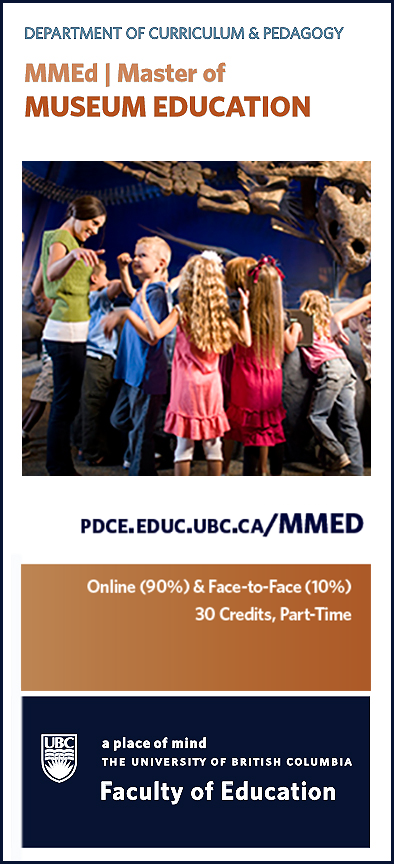
Master of Museum Education (MMEd)
All graduate program applicants in the Department of Curriculum and Pedagogy (EDCP) must meet the minimum entry requirements established by the Faculty of Graduate and Postdoctoral Studies, which oversees graduate work at UBC. Applicants who do not meet the minimum requirements will be considered for admission only in exceptional circumstances.
Academic Background
The basic admission requirement to the Master’s program is an approved bachelor’s degree. In addition, successful applicants typically have high grades; a coherent, well-written statement of intent; and strong references. Teaching experience is preferred.
- All students must meet UBC Faculty of Graduate Studies requirements which include:An approved 4 year Bachelor’s degree.
- A 4-year Bachelor’s degree in Education or other appropriate area.
- A GPA of B+ (76%) or equivalent.
For transcripts from universities in China, this usually corresponds to an 85% on most PRC university grading systems. If applicant is from a Key University, the minimum grade requirement is B (=80% on PRC grading scale) or higher.
TOEFL Scores
Applicants are required to submit a satisfactory official score report from one of the following organizations, obtained no more than two years prior to the application date:
- TOEFL – Test of English as a Foreign Language, minimum score 580 (paper-based) or 237 (computer based), or new minimum TOEFL score of 92 (with a minimum of 22 for each component).
- IELTS – International English Language Testing System. Minimum overall band score 6.5, with no component less than 6.0.
The official score reports must be sent directly by the testing organization to this department: Institution Code 0965, Department Code 85.
Master of Museum Education (MMEd)
The UBC MMEd program is a 30-credit program (i.e., students will be required to complete ten 3-credit courses for the degree). The final 3-credits of the program may be a capstone project, which will be developed from original research conducted by students. A maximum of 6 credits may be taken at the 300-400 level.
The next intake of the MMED (MED9) will commence September 2026. Classes in this program will begin online in September, 2026 and finish December, 2028. Schedule is subject to change.
Example of a previous program schedule
Year 1
1. EDCP 558 (3) Learning in Informal Environments | Area: Pedagogy in Museums
2. EDCP 565 (3) Teaching in Museums | Area: Informal Learning Theory
3. EDUC 567 (3) Curriculum Issues and Theories in Museums | Area: Curriculum Theory in Museums
4. ANTH 518 (3) Museum Methods *scheduled over a 6-days at UBC | Area: Museum Practice
5. Elective 1 (3) Elective option #1 | Area: Specialization
Year 2
6. EDCP 545 (3) Education Programming in Museums | Area: Pedagogy in Museums
7. EDCP 500 (3) Research Methodology in Education (Focus on Museums) | Area: Research Methods in Museums
8. EDCP 585 (3) Educational Design in Exhibitions | Area: Exhibition Design Practices
9. Elective #2 (3) Elective option #2 | Area: Specialization
10. Elective #3 (3) Elective option #3 | Area: Specialization / or Graduating Paper
Elective Options
Approved electives may be taken at other universities, subject to the terms of the Western Deans’ Agreement. There are wide variety of on-campus (UBC-Vancouver or Okanagan) and on-line course which are acceptable as electives and vary in the offering from year to year – Examples include:
Museology
- EDCP 590 | Graduating Paper (3 credits)
- EDCP 598 | Field Experience (3 credits)
- ANTH 541 | Advanced Seminar in Critical Museum Anthropology (3/6 credits)
- ANTH 341A | Museums, Heritage and Memory (3 credits)
- CCST 501 | Contemporary Contextual Issues for Critical and Curatorial Practice (3 credits)
Art Education
- EDCP 504 | Review of Research in Art Education (3 credits)
- EDCP 522 | Psychological Foundations of Art Education (3 credits)
- EDCP 523 | Seminar in Art Education (3 credits)
- EDCP 514 | Arts-based Educational Research: A/R/tography (3 credits)
Research Methods
- EDCP 510 | Video Ethnography in Educational Research: Culture, Technology and Interpretation (3 credits)
- EDCP 513 | Case-study Research and Cross-Case Analysis (3 credits)
Environmental Education
- EDCP 538 | Theory and Research in Environmental Education (3 credits)
- EDST 565A | Adult Environmental Education (3 credits)
History and Social Studies Education
- EDCP 541 | Problems in Historical Understanding (3 credits)
- EDST 504A | History of Educational Policy (3 credits)
Science Education
- EDCP 555 | Critical Analysis of Curriculum in Science Education (3 credits)
- EDCP 557 | Conceptual and Practical Issues in Teaching and Learning of the Sciences (3 credits)
- EDCP 559 | Research in the Teaching and Learning of the Sciences (3 credits)
- EDCP 449 | Earth and Space Science Beyond the Textbook (3 credits)
- EDCP 450 | Life Science Beyond the Textbook (3 credits)
- EDCP 451 | Physical Science Beyond the Textbook (3 credits)
First Nations Studies
- ETEC 521 | Indigeneity, Technology, and Education (3 credits)
- EDUC 442 | Critical Issues in Indigenous Education (3 credits).
Adult Education
- ADHE 412 | An Overview of Adult Education (3 credits)
- ADHE 327 | Teaching Adults (3 credits)
- ADHE 330 | The Community Practice of Adult Education (3 credits)
- ADHE 329 | Developing Short Courses, Workshops and Seminars (3 credits)
Library Education
- LIBE 465 | Organization of Learning Resources(3 credits)
- LIBE 467 | Information Services (3 credits)
Early Childhood
- ECED 421 | Supporting Young Children Through Home, School, and Community Relationships (3 credits)
- ECED 405 | Foundations of Early Childhood Education (3 credits).
Apply Online
The next intake of the MMED (MED9) will be accepting applications from October 2025 for a start date of September 2026.
Contact Us
Mailing Address
Department of Curriculum & Pedagogy
Faculty of Education
University of British Columbia
Scarfe Building 2125 Main Mall
Vancouver BC V6T 1Z4 Canada
Important Numbers
Apply for graduate programs:
Gina Hiu Lam Wong
604.822.5367
Email: edcp.grad@ubc.ca
Apply for undergraduate programs:
Contact the Teacher Education Office
Faculty
-
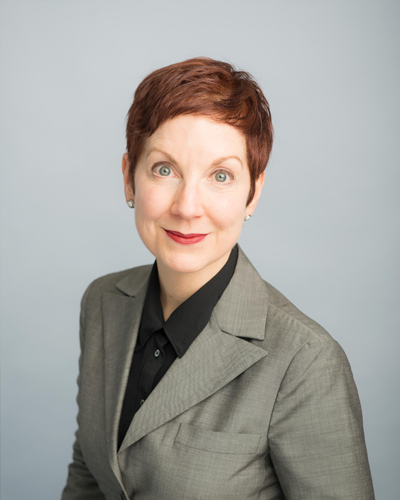
Marie-France Berard
Lecturer
-
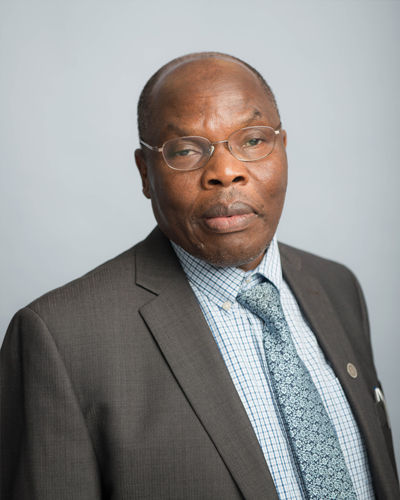
Samson Nashon
Professor & Head
-
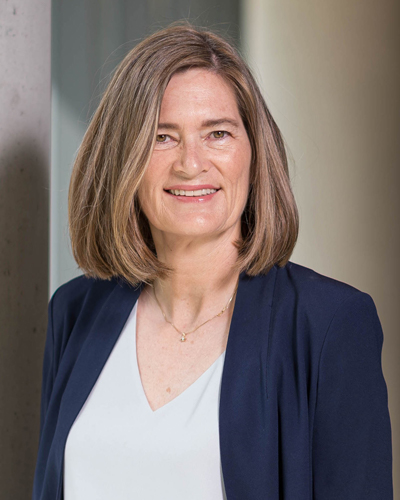
Cynthia Nicol
Professor
